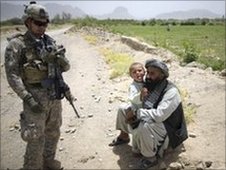 The US military has said it could take weeks to determine the impact of the leak of more than 90,000 classified military records.
The US military has said it could take weeks to determine the impact of the leak of more than 90,000 classified military records.
The documents, published online at the website Wikileaks, detail the war in Afghanistan, including previously unreported civilian deaths.
They reveal concerns within Nato that Pakistani intelligence helped the Taliban - something Islamabad denies.
The White House condemned the leak as a possible threat to national security.
Wikileaks describes the documents as battlefield and intelligence reports compiled by a variety of military units during the period 2004-09.
Calling their release a "criminal act", Pentagon spokesman Col Dave Lapan said US officials were reviewing the documents to determine "whether they reveal sources and methods" and might endanger US and coalition personnel.
It could take "days, if not weeks" to go through the leaked documents, he said.
White House spokesman Robert Gibbs said the leak did not divulge anything new about the nature of the war in Afghanistan but the details revealed could be damaging.
"[It] has a potential to be very harmful to those that are in our military, those that are co-operating with our military and those that are working to keep us safe," he said.
The founder of Wikileaks, Julian Assange, told a news conference in London he had no reason to doubt the reliability of the reports.
He said the release of the material was comparable to the opening of the archives of the Stasi, the East German secret police.
He said Wikileaks had "tried hard to make sure that this material does not put innocents at harm", and had held back about 15,000 reports at the request of the source.
"All the [released] material is over seven months old so is of no current operational consequence, even though it may be of very significant investigative consequence."
The release of the documents has angered some US politicians.
Dianne Feinstein, the chair of the Senate Intelligence Committee, said a "major investigation" should be launched into this "serious breach of national security".
John Kerry, the head of the Senate Foreign Relations Committee, said the leak came at a "critical stage" for US policy in the region.
"However illegally these documents came to light, they raise serious questions about the reality of America's policy toward Pakistan and Afghanistan," he said.
War crimes?
The documents were given in advance to the New York Times, The Guardian and the German news magazine, Der Spiegel.
A day after the documents went online, the newspapers continued to publish extracts that highlighted the day-to-day loss of life and blunders.
One 2006 report, published in The Guardian, reveals a glimpse of how Osama bin Laden continued to give orders for operations in Afghanistan at meetings held in Pakistan.
This, despite the head of the CIA saying there had been no detailed information on the al-Qaeda leader since 2003.
Another of the leaked reports, from 2007, suggests how civilian casualties could be underplayed.
The initial report makes no mention of civilian casualties as a marine convoy near Jalalabad opened fire while tearing back to base after being rammed by an explosives-filled van.
An update to the report states eight Afghan civilians were killed and 34 wounded. A later Afghan Human Rights Commission report into the incident found that 19 civilians had been killed as the marines drove down the highway firing their weapons.
The unit was later removed from Afghanistan.
After being asked repeatedly by reporters whether he believed some of the incidents described in the documents constituted war crimes, Mr Assange said: "It is up to a court to decide, clearly, whether something is, in the end, a crime.
"That said, prima facie, there does appear to be evidence of war crimes in this material," he added.
Source suspicion
Pakistan's government, meanwhile, denied claims its Inter-Services Intelligence (ISI) agency backed the Taliban in the war in Afghanistan.
Wikileaks founder Julian Assange: 'This is the story of the war since 2004'
One of the leaked documents refers to an alleged meeting in December 2006 between insurgents and the former ISI chief, Lt Gen Hamid Gul, during which he claimed to have dispatched three men to Kabul to carry out attacks.
He dismissed the Wikileaks material, telling the BBC it was "pure fiction which is being sold as intelligence".
The Pakistani presidential spokeswoman, Farahnaz Ispahani, said the leaks might be an attempt to sabotage the new strategic dialogue between the US and Pakistan.
The reports also suggest:
The Taliban has had access to portable heat-seeking missiles to shoot at aircraft
A secret US special forces unit, Task Force 273, has been engaged on missions to "capture or kill" top insurgents listed on a Joint Priority Effects List (JPEL)
Many civilian casualties - caused by Taliban roadside bombs and Nato missions that went wrong - have gone unreported
Iran is engaged in an extensive covert campaign to arm, finance and equip the Taliban and Afghan warlords allied to al-Qaeda
Afghan President Hamid Karzai's office said the documents "clearly support and verify Afghanistan's all-time position that success over terrorism does not come with fighting in Afghan villages, but by targeting its sanctuaries and financial and ideological sources across the borders".
Wikileaks was not revealing the source of its information, but denied suggestions it was a US army intelligence analyst, Specialist Bradley Manning, who is already awaiting trial on charges including releasing classified information.
A former hacker, Adrian Lamo, said Spc Manning boasted to him about handing over military videos and 260,000 classified US embassy messages to Wikileaks.
Earlier this year, Wikileaks posted a video on its website which it said showed the killings of civilians by a US military helicopter in Baghdad in 2007.



